AI Expense Management for Short-Term Rental Property Managers
Managing property-level expenses doesn’t have to be messy. In this article, we explore how AI is redefining expense management for Short-Term Rental businesses—from automatic receipt capture and categorization to syncing costs with bank transactions and owner statements. Learn how property managers are streamlining operations, improving transparency, and saving hours each month with AI-driven tools built for the unique needs of STRs.
May 20, 2025
Corey
.png)
How AI-driven solutions are transforming Short-Term Rental expense management workflows

Expense management is one of the most challenging aspects of running a Short-Term Rental (STR) property management business. With multiple owners, properties, and recurring costs, the risk of manual error, missed expenses, or lost receipts is high—and the financial and trust repercussions can be significant. Thanks to recent advances in artificial intelligence (AI) and automation, property managers now have access to intelligent tools that streamline expense capture, categorization, and reporting. This article explores how AI-driven solutions are transforming expense management workflows in the STR industry, resulting in greater transparency, accuracy, and time savings.
The Evolution of Expense Management in Short-Term Rentals
Historically, managing expenses for STRs was a manual process that relied heavily on spreadsheets, paper receipts, and hours of data entry. Bookkeepers and property managers had to:
- Collect physical and emailed receipts from field staff and vendors
- Manually enter each transaction into accounting software or spreadsheets
- Assign expenses to the correct property, owner, and category
- Reconcile spending with bank records
- Assemble documentation for owner statements
These tasks were not only time-consuming, but also susceptible to errors, missing documentation, or miscategorizations—often leading to disputes with owners and inaccurate financial reporting. As portfolios grew, so did the complexity, making it difficult for managers to maintain property-level visibility and control over expenses.
Why Accuracy in STR Expense Accounting Matters
Precise expense tracking in Short-Term Rental management isn’t just about bookkeeping hygiene. It has a direct impact on:
- Profitability: Misallocated or missed expenses reduce recoverable income. Managers often “eat” expenses rather than pass them to owners when proper documentation is lacking.
- Owner Trust and Retention: Owners expect detailed, transparent statements. Unexplained or undocumented charges erode confidence and can result in churn.
- Compliance: Jurisdictions with trust accounting regulations require accurate allocation of client funds and solid audit trails.
- Strategic Insight: Accurate property-level profit and loss (P&L) data helps property managers identify cost-drivers, optimize operations, and make informed decisions.
Far too many STR operators leave money on the table because they forget to systematically allocate or properly document expenses per property—especially when operating at scale. The result is unnecessary margin loss and preventable owner disputes.
AI-Driven Automation: Modern Solutions for STR Expense Management

The landscape has shifted dramatically. Today, a range of automation technologies purpose-built for Short-Term Rental managers are available to transform how expenses are handled:
1. Virtual Cards Per Property or Purpose
Financial platforms like Ramp allow property managers to issue dedicated virtual or physical cards per asset, purpose, or team member. This ensures:
- Automatic property-level tracking: Each purchase can be tied back to an exact property or department with ease.
- Spending controls: Set custom limits, rules, and restrictions to prevent unauthorized charges.
- Purpose controls: Establish card types, like a subscription card, and pay all online subscription payments for easy categorization purposes.
By leveraging virtual cards strategically, STR managers gain clearer financial visibility, tighter control over spending, and simplified expense categorization—laying the foundation for smarter, scalable expense management.
2. Rule-Based and AI Expense Categorization
Modern STR accounting tools utilize both logic-based rules (“if this, then that”) and AI-powered machine learning to automatically categorize transactions. For example:
- Cleaning charges from known vendors are auto-tagged
- Purchases from recurring suppliers are split across relevant properties
This reduces manual review and enforces consistency across the chart of accounts. Over time, leveraging AI systems can help these tools learn and adapt to manager feedback, continuously improving accuracy.
3. AI-Enabled Receipt Capture and Matching
Applications like Clearing offer mobile and web-based receipt capture that simplifies the entire workflow related to handling reimbursable expenses. This means, vacation rental property management companies can allow:
- Staff or vendors to snap photos of their purchase receipts in the field
- AI to parse receipt details (amount, date, vendor), match them to bank or card transactions, and assign them to the correct property/category
- Operational team members to retain, search, and append receipts to owner statements efficiently
This workflow all but eliminates lost receipts and manual data entry by bringing ease to collection, categorization, and reconciliation—saving time while increasing accuracy.
4. Seamless Software Integrations
Expense management tools designed for the STR industry now offer deep integrations, including:
- PMS, booking, and cleaning software: Sync bookings, vendor payments, and recurring expenses
- Accounting and banking platforms: Connect directly to bank feeds for real-time expense tracking
- Amazon Business: Automatically import purchases and allocate them to properties, categories, and owners
Leading aggregation platforms like Clearing facilitate these integrations, creating a truly unified tech stack for STR operators.
Reporting and Transparency: Best Practices for Modern Expense Management

1. Attaching Receipts to Transactions and Owner Statements
Best-in-class AI expense systems ensure every transaction is backed up by digital receipts, which can be:
- Linked to the corresponding expense line item
- Included in owner statements for full transparency
This approach not only boosts trust with owners, but also creates a defensible audit trail to cover both internal and compliance requirements.
2. Property-Level Profit and Loss (P&L) Insights
The ability to categorize and allocate expenses per property means:
- Accurate, real-time profit and loss tracking for every listing
- Immediate visibility into cost drivers (e.g., cleaning, utilities, repairs)
- Informed discussions with owners using data-driven evidence
Automated, AI-enhanced reporting eliminates the need for manual P&L compilation and delivers granular, actionable insights.
Setting Up for Success: Choosing Strong STR Financial Management Software

A successful expense management workflow for Short-Term Rentals hinges on purpose-built technology. Look for platforms that:
- Enable property- and owner-level allocation of every expense
- Feature robust AI receipt parsing and transaction matching
- Allow custom rules and workflows to fit your operation
- Sync with key vendors, banks, Amazon, and more
- Provide owner-ready statements with detailed documentation
Clearing exemplifies these capabilities with dedicated STR expense automation and compliance-driven features.
Transform Your STR Expense Management with AI Automation
Manual expense management is a recipe for errors, lost revenue, and frustrated owners. By implementing AI-driven expense management tools—virtual cards, logic-based rules, receipt automation, and integrated STR software—you can save hours each month, improve accuracy, and build rock-solid trust with your clients.
Ready to streamline your operations and experience transparent, automated expense management for your Short-Term Rental portfolio?
Book a personalized demo of Clearing to see how modern AI automation can change your STR business operations.
Clearing is a Financial Technology Company, not a bank.

.png)
.png)




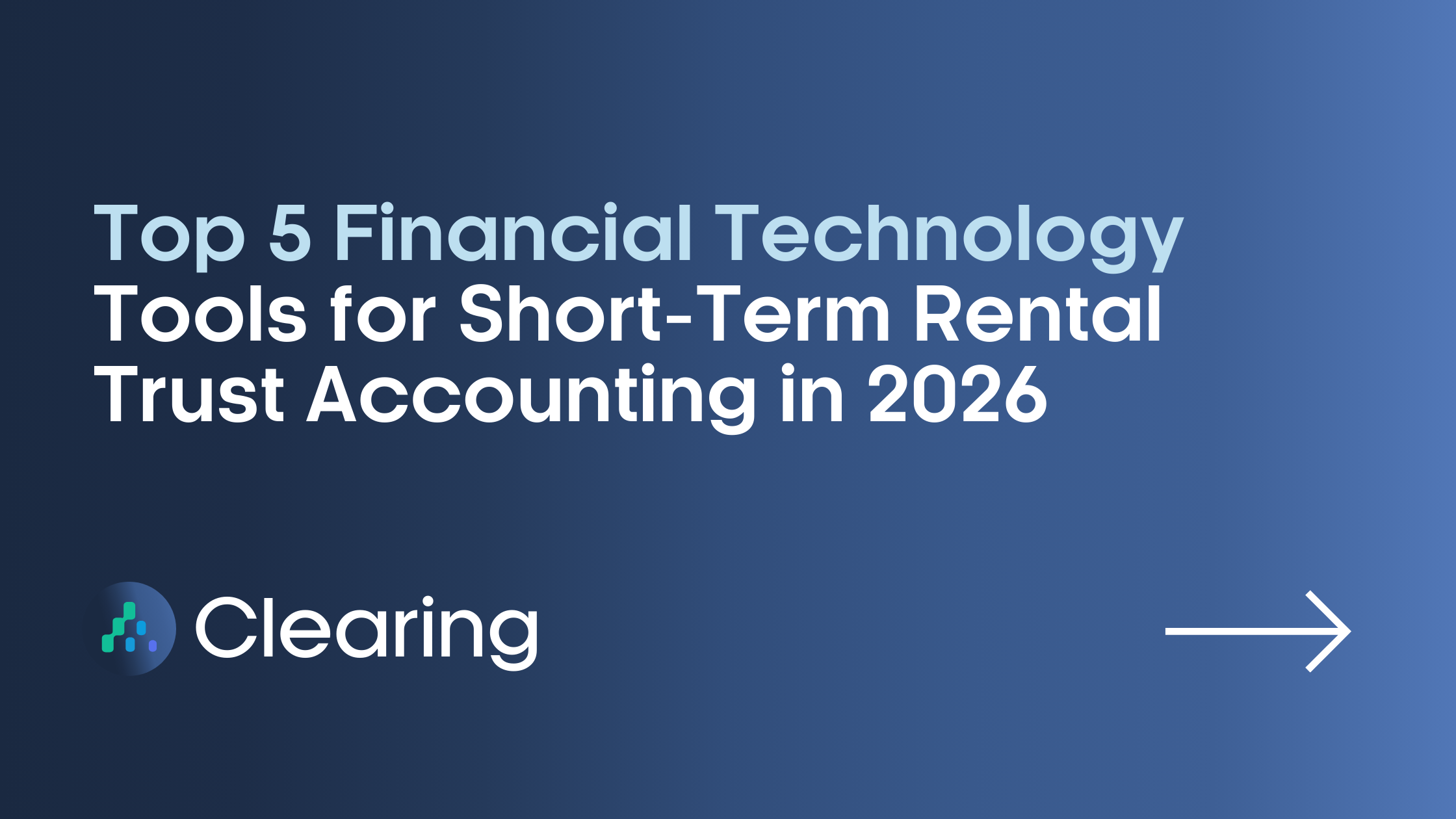

.png)
.png)
.png)
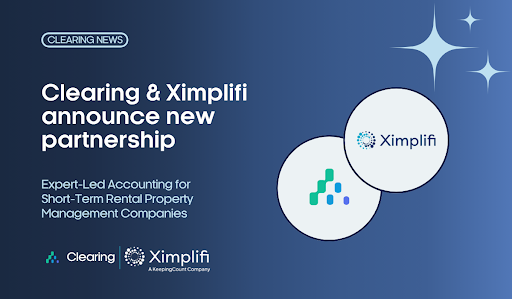
.png)
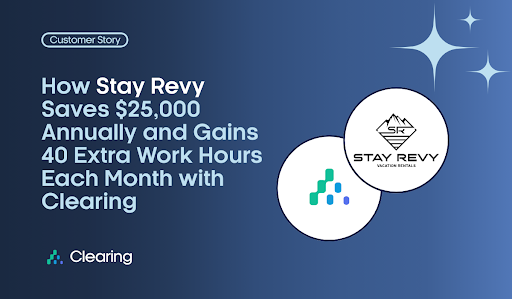
.png)
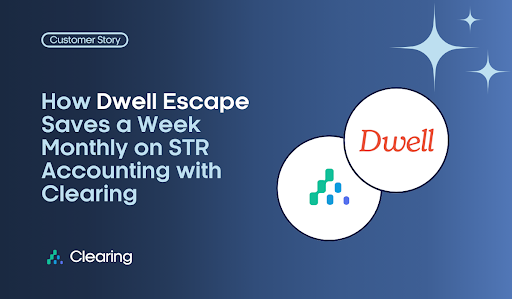
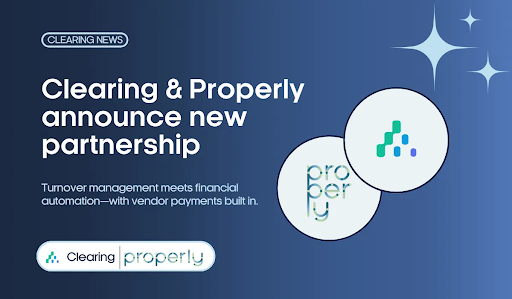
.png)
.png)
.png)
%20(1).png)
%20(1).png)
%20(1).png)
.png)
%20(2).png)
%20(1).png)
%20(1).png)
.png)

.png)
.png)
.png)
%20(1).png)
.png)
.png)
.png)
.png)
.png)
.png)
%20(1).png)
.png)
.png)
.png)
%20(1).png)
%20(1).png)
%20(1).png)








.jpg)
%20(1).png)
%20(1).png)
%20(2).png)
%20(1).png)

%20(1).png)
%20(1).png)
%20(1).png)



%20(1).png)
%20(1).png)
%20(1).png)
%20(1).png)
%20(1).png)


%20(1).png)
%20(1).png)
%20(1).png)
%20(2).png)
%20(2).png)



%20(2).png)


%20(2).png)
%20(1).png)
.png)


%20(2).png)
%20(2).png)

.jpg)
.png)
.png)
.png)


